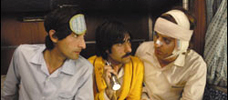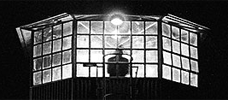Reviews
Miryang
Lee Chang-dong
South Korea, 2007
Credits
Review by Leo Goldsmith
Posted on 04 October 2007
Source CJ Entertainment 35mm print
Categories The 45th New York Film Festival
Lee Chang-dong’s new film holds many secrets, and the act of writing about it necessarily risks revealing far too many of them. There are many small surprises, twists, and lunges that Lee artfully plants throughout like submerged mines, in the steady flow of his film. More of a constant stream than a succession of wildly unpredictable events, Secret Sunshine mimics something of the rhythm and fluctuation of real life — long lulls are punctuated by tiny repetitions or occasional, unforeseen swerves — such that even a cursory description of the film launches one right back into the gentle but insistent torrent of its narrative.
It might at least be safe to relate that the film primarily concerns Shin-ae, a young widow from Seoul, who has just moved with her young son to the small city of Miryang (her dead husband’s birthplace) in central South Korea to open a small piano conservatory. Breaking down on her way into town, she is quickly befriended by Mr. Kim, a local mechanic played by the star of many a Korean blockbuster, Song Kang-ho. This meeting is casual enough, but sudden, random tragedy in Shin-ae’s life soon sends the piano teacher on an odyssey of embattled (and seemingly futile) self-discovery, a path down which the ever-pleasing Mr. Kim is at pains to follow her.
As in his portrayal of the near-simpleton ramen salesman, Gang-du, in The Host, Song here again plays against his usual macho, action-movie type. As the rather pathetic Mr. Kim, perpetually smitten with Shin-ae, Song seems to provide an otherwise often relentless film with a measure of light comedy, his lengthy and always self-effacing pursuit of the beleaguered young woman balancing pathos with bathos. Chided by his friends and his mother as a perennial, 39-year-old loser, Kim follows Shin-ae around like a puppy, catering to her every whim, offering unsolicited help, and waiting patiently for any sign of acceptance or romantic recognition, all with the same goofy, hopeful grin. Kim’s story is very much like Shin-ae’s told in a different register: a story of frustrated hopes and desires, searches for something greater than the banality of everyday life that are cruelly batted down by circumstance. Both Shin-ae and Kim look for something that will allow them to transcend the suffering or vacuity of their lives — Shin-ae through evangelical Christianity; Kim through Shin-ae — and each seems perpetually to fail in this search.
But while Kim’s search for satisfaction is a tragicomic tale of a sort of Korean 39-year-old virgin, the kind of needy, infantile, self-absorbed male that is also common in the films of Hong Sang-soo, Shin-ae’s story is a matter of life and death, an often dispiriting, occasionally brutal, and always deeply rendered glimpse into the life of a young woman desperately trying to hold onto what little sanity and sense of self remains to her. Jeon Do-yeon’s riveting, mercurial portrayal of Shin-ae — a performance that earned her Cannes’ award for Best Leading Actress — is the film’s mesmerizing center, and the reactions that register on the actress’ face with each twist and bend of the plot set the film’s tempo. In interviews, Jeon has revealed that she did not prepare at all for her role as Shin-ae, finding the events of the film’s plot so extreme as to seem alien to her. Instead, she seems to have simply inhabited the role, living through all the buffeting of its situations in a way that drives her from measured confidence to utter despair to catatonia to euphoria and back.
Lee’s great achievement in Secret Sunshine, his first film after serving for two years as South Korea’s Minister of Culture and Tourism, is not only in crafting a natural, well-paced, and utterly uncontrived screenplay, but also in exercising the patience necessary to follow Shin-ae as she weathers the story’s many trials. Even as the film piles awkwardness and suffering upon its character, it never feels exploitative or emotionally manipulative, maintaining a restrained tone entirely devoid of melodrama. This is also a tribute to Cho Yong-kyou’s exceptional camerawork, which is agile and floating without being seasick, and follows Shin-ae’s story without driving it into the audience’s face. Like the subtle craft of the screenplay, the cinematography gracefully manages to capture the achingly commonplace surroundings of Miryang, the normal, modern-looking buildings and cars and people, intermingled with brief glimpses — of light, water, and air — that come briefly into view, never as ethereal suggestions of another, better world, but always as small, beautiful reminders of our own imperfect one.
More The 45th New York Film Festival
-

The Darjeeling Limited
2007 -

Hamlet
1921 -

The Romance of Astrea and Celadon
2007 -

Secret Sunshine
2007 -

Paranoid Park
2007 -

Alexandra
2007 -

Before the Devil Knows You’re Dead
2007 -

The Diving Bell and the Butterfly
2007 -

The Last Mistress
2007 -

The Man from London
2007 -

I’m Not There
2007
We don’t do comments anymore, but you may contact us here or find us on Twitter or Facebook.



